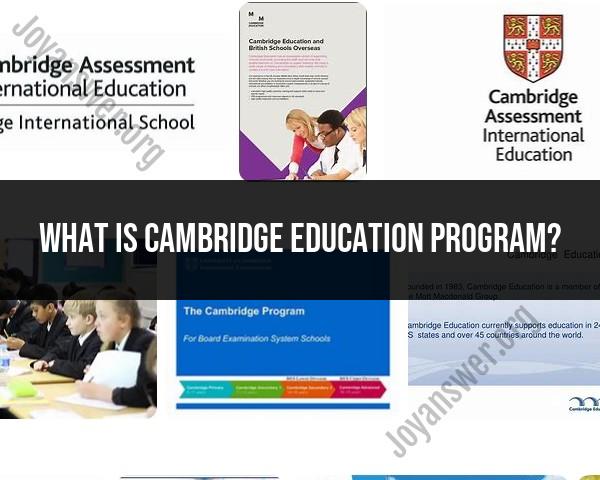What is Cambridge education program?
The Cambridge Education Program, often referred to as the Cambridge International Program or simply Cambridge, is an international education system developed by the University of Cambridge in the United Kingdom. This program is known for its rigorous academic standards and global recognition. Here is an overview of the Cambridge Education Program:
1. Curriculum and Qualifications:
Cambridge Primary: This is the first stage of the program and is typically for students aged 5 to 11. It provides a solid foundation in English, Mathematics, and Science.
Cambridge Secondary 1: Designed for students aged 11 to 14, this stage continues to build on the core subjects and introduces other subjects like History, Geography, and Art and Design.
Cambridge Secondary 2 (IGCSE): This is a globally recognized qualification typically taken at age 16. It covers a wide range of subjects, and students can choose from a variety of elective subjects.
Cambridge Advanced (AS and A-levels): These qualifications are typically taken by students aged 16 to 19. They are highly specialized and provide an in-depth understanding of subjects. A-levels are often a requirement for university admissions in the UK and are also recognized worldwide.
Cambridge Pre-U: This is an alternative to A-levels, offering a broader and deeper study of subjects.
2. International Recognition:
Cambridge qualifications are widely recognized and respected by universities and employers around the world. They are seen as a benchmark of academic excellence.
3. Teaching and Learning:
The Cambridge Education Program emphasizes active and inquiry-based learning. It focuses on developing critical thinking, problem-solving, and research skills. Teachers are encouraged to use a variety of teaching methods and resources to engage students.
4. Assessments:
Assessment in Cambridge programs is a combination of coursework and examinations. It places a strong emphasis on application of knowledge, critical thinking, and problem-solving, rather than rote memorization.
5. Flexibility:
The program allows for flexibility and choice, particularly at the advanced levels (A-levels and Pre-U), where students can select subjects of interest and build a personalized curriculum.
6. Availability:
Cambridge programs are available in over 160 countries, and many schools worldwide offer these qualifications. This global reach makes it accessible to a diverse range of students.
7. Professional Development:
Cambridge provides training and support for teachers to help them effectively deliver the program.
8. Support for Schools:
Cambridge offers resources, guidance, and support to schools implementing their programs.
Cambridge Education Program is often chosen by schools, students, and parents seeking a high-quality international education with a strong emphasis on critical thinking and problem-solving. It offers a pathway from primary education to university admission, making it a comprehensive educational system.
Cambridge Education Program: Unveiling the Approach
The Cambridge Education Program is a highly respected international curriculum that offers students a rigorous and challenging academic experience. The program is designed to help students develop the knowledge, skills, and values they need to succeed in the 21st century.
The Cambridge Education Program is based on a number of key principles, including:
- Academic excellence: The program is designed to challenge and inspire students to achieve their academic potential.
- Holistic development: The program focuses on developing students' academic, social, and emotional skills.
- Global citizenship: The program prepares students for success in a globalized world by teaching them about different cultures and perspectives.
The Cambridge Educational Philosophy and Methodology
The Cambridge Educational Philosophy is based on the belief that all students have the potential to succeed. The program is designed to help students develop their critical thinking skills, problem-solving skills, and creativity.
The Cambridge Educational Methodology is based on the following principles:
- Inquiry-based learning: Students are encouraged to learn by asking questions and investigating problems.
- Collaborative learning: Students work together to learn from each other and to complete projects.
- Differentiated instruction: Teachers provide different learning experiences to meet the needs of all students.
Key Components of the Cambridge Education Program
The Cambridge Education Program consists of a number of different components, including:
- Primary and Lower Secondary programs: These programs are designed for students aged 5-14. They cover a wide range of subjects, including English, mathematics, science, history, geography, and the arts.
- Upper Secondary program: This program is designed for students aged 14-19. It offers a more specialized curriculum in a variety of subjects.
- Advanced Subsidiary Level (AS) and Advanced Level (A) Level qualifications: These qualifications are designed for students aged 16-19. They are equivalent to the first and second years of university study.
Academic Excellence and Student Development in Cambridge
The Cambridge Education Program is known for its academic excellence. Students who complete the program are well-prepared for university and for success in their future careers.
The program also focuses on student development. Students learn how to think critically, solve problems, and work effectively with others. They also develop a strong sense of global citizenship.
Joining the Global Community of Cambridge Learners
The Cambridge Education Program is offered in over 10,000 schools in over 160 countries. This means that students who complete the program are part of a global community of learners.
Cambridge graduates are highly sought-after by universities and employers around the world. They are known for their academic excellence, their problem-solving skills, and their ability to work effectively in a globalized world.
Conclusion
The Cambridge Education Program is a highly respected international curriculum that offers students a rigorous and challenging academic experience. The program is designed to help students develop the knowledge, skills, and values they need to succeed in the 21st century.













